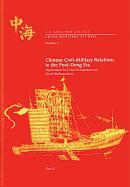Chinese Civil-Military Relations in the Post-Deng Era: Implications for Crisis Management and Naval Modernization
BücherAngebote / Angebote:
NOTE: NO FURTHER DISCOUNT FOR THIS PRINT PRODUCT-- OVERSTOCK SALE-- Significantly reduced list price while supplies lastChina Maritime Studies No. 4. Addresses two analytical questions: What has changed in Chinese civil Military relations during the post-Deng Xiaoping era? What are the implications of this change for China's crisis management and its naval modernization?Why are these important? Addressing these questions is important for three major reasons.1) First, because the People s Liberation Army (PLA) is a party army, it is commonly assumed that its pri- mary function is domestic politics that is, to participate in party leadership factional politics and to defend the Chinese Communist Party (CCP) against political opposition from Chinese society. For the past twenty years, however, the PLA has not been em- ployed by such party leaders as Jiang Zemin and Hu Jintao against political opposition from either the CCP or Chinese society. The PLA s ground force, which is manpower- intensive and therefore the most appropriate service for domestic politics, has been continuously downsized. Technology and capital-intensive services that are appropriate for force projection to the margins of China and beyond and for strategic deterrence but are inappropriate for domestic politics such as the PLA Navy (PLAN), the PLA Air Force (PLAAF), and the Second Artillery (the strategic missile force) have been more privileged in China s military modernization drive.This study, by examining change in Chinese civil-military relations, undertakes to resolve this analytical puzzle.2) Second, China s civil-military interagency coordination in crisis management during the post-Deng era has remained an area of speculation, for lack of both information and careful analysis. By analyzing change in Chinese civil-military relations, this study aims to shed some light on this analytical puzzle as well.3) Finally, the PLAN (PLA Navy) was previously marginalized within the PLA, partly because the lat- ter was largely preoccupied with domestic issues and politics, where the PLAN is not especially useful. By exploring change in Chinese civil-military relations, this study also attempts to explain why during the post-Deng era the PLAN has become more impor- tant in China s military policy. Students participating in Chinese studies classroom assignments may be interested in this volume for research. This work may also be of interest to military and political science students as well as military historians, military strategists, and political science scholars.
Folgt in ca. 15 Arbeitstagen
